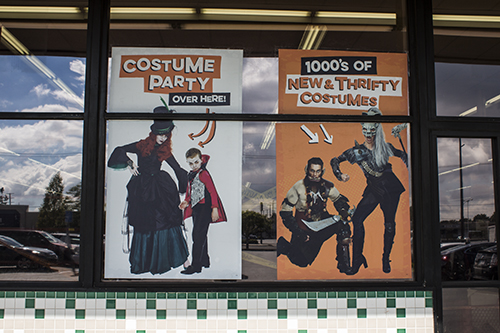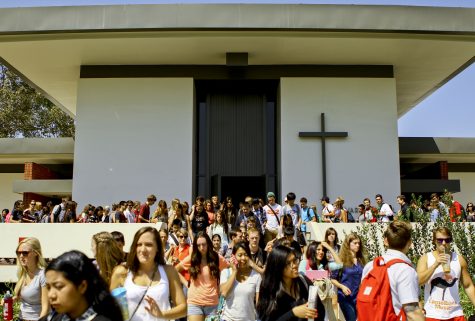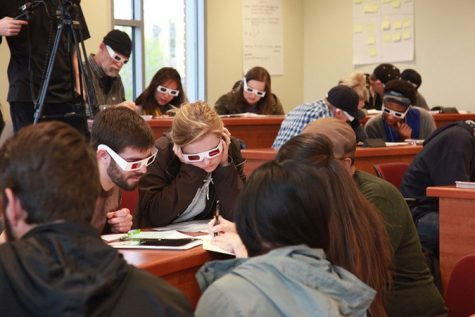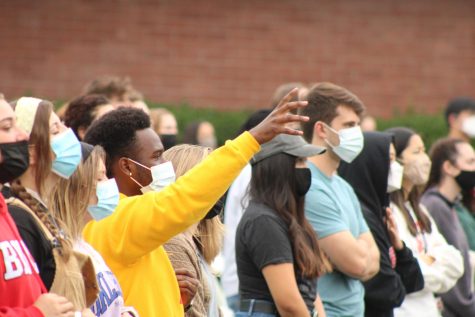A battle rages for the hallows
Spiritual warfare elicits fear around the fall season, but for the wrong reasons.

Caroline Sommers/ THE CHIMES
October 18, 2016
The very real fight in the spiritual realm for the souls of Christians and non-Christians alike can take many forms. However, Halloween often suffers the most unmerited criticism for the introduction of demonic or pagan forces into suburban American households — but the opposite tends to be true.
Unmerited Criticism
The Halloween familiar to current American society began early in the world’s history — in Ireland with Druidic priests. Ireland created a festival to celebrate the harvest, which brought about gathering for feasts and community. Near the end of the harvest, non-farming Druidic priests would go door-to-door asking for donations to stow for their winter nourishment. Soon, they began threatening residents with spells if they didn’t award them with goods. Thus, trick or treat.
Doug Hayward, intercultural studies professor emeritus, has experienced hands-on spiritual warfare in his lifetime — from simple prayer to rid a student from temptations to demonic possessions in foreign countries. His judgment on the integration between the holiday of Halloween and heightened spiritual warfare is the fear people have is complete nonsense.
“Spiritual discipleship and growth in holiness involves addressing the points of challenge to our faith: the world, the flesh and the devil. Now most discipleship programs deal with problems of the flesh or the temptations of the world, but they completely ignore the fact that Satan is out there as our adversary,” Hayward said. “I recognize that a lot of Christians [are afraid of participating in Halloween] so in order not to be offensive, I go along with them. I support their weaker conscience on this. But I really think it’s much ado about nothing.”
Little Spiritual Consequence
On the other hand, the only peak of demonic spiritual activity Hayward notices year after year occurs around the time of the festival of Kali in India. Kali represents war, wrath and revenge, though in some tales she also stands as a pillar of fertility and justice. The festival of Kali in India brings about worship of the goddess, often bringing about a heightened number of individuals opening themselves up to the spiritual realm without filter.
According to Hayward, demonic influence across India peaks at this time of year, as Hindus across the nation feel an obligation to worship and praise the goddess so as to avoid any punishment wrought by her anger at their disobedience. However, the American Halloween presents little, if anything, to spiritual influence in the nation.
Dean of Talbot School of Theology Clint Arnold taught a course with Hayward and a former Biola psychology professor regarding spiritual warfare several years ago. Their student-involved dialogue brought about clarity, as well as newfound questions.
“I think our culture has taught us not to take the spiritual dimension seriously,” Arnold said. “[Halloween could be dangerous] insofar as someone takes the meaning, the original meaning of the holiday in terms of the evil side — not all saints day — and viewed it as an opportunity to invoke spirits, as an opportunity to call on a pagan deity or to practice certain rituals of power or invested the forums with meaning. I think that could be dangerous.”
Ungrounded Hearsay
Needless to say, Arnold firmly agrees the hubbub regarding Halloween’s intrinsic evil nature tends to lean on ungrounded hearsay. However, on the subject of warfare, often the spiritual and the psychological play an important role in this brand.
Many people get either problem confused with the other, while some ignore the problem completely. According to Peter Hill, dean of Rosemead school of psychology, spiritual warfare is quite real — but students have nothing to worry about during Halloween.
“I do think, and this is maybe where psychology comes in, that there’s all, sort of, often what I would call a social contagion that exists. In other words, if people do bizarre things or associate it with a holiday like Halloween, people sometimes act out of character,” Hill said. “People do crazy things sometimes, because of other factors. And one of them is that there is a holiday where we’ve justified a little bizarre behavior.”
Arnold, a former Knott’s Scary Farm worker, recalls the days he would scare park guests in an old log ride. While he admits the process brought joy and laughter from him as a teenager, the cruelty of the practice makes him cringe slightly with a soft chuckle of teenage memories. He shares he had no objection in allowing his own children to partake in Halloween, telling stories of his son dressing like a Dalmation and earning extra candy for wagging his tail.
Close to this point, Arnold also suggests the over-exaggeration of the demonic in Christian culture has run rampant and devoured many good things in its path. A Harry Potter fan himself, Arnold confirms the fear many Christian parents have of demonic influence through children’s books or dressing up is unwarranted.
In confirmation, Hayward even suggests partaking in Halloween can elicit a healthy sense of freedom for children and adults alike. He names this as a role reversal phenomenon, in which children pretend to be the exact opposite of their everyday roles — policemen, firemen, doctors.
Of course, the furthest reach of this phenomenon rests in children dressing as dead beings, skeletons, goblins or Satan himself. This is due to the beginnings of the Christian influence on holiday: as a means to mock the devil, demons and evil in general from its power to influence Christians.
“Dressing up is fun. It’s that emotional release that happens when you’re allowed to be something you cannot be in normal life. All that candy is probably not good for the kids for the day, but if it’s only once a year it’s sort of like breaking your diet every Saturday,” Hayward said.






